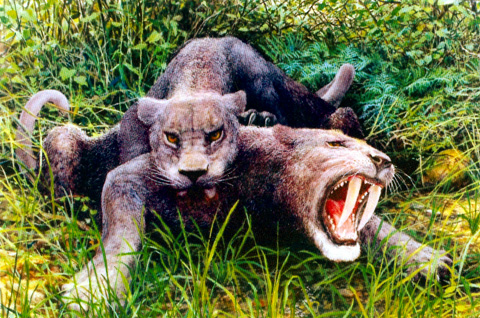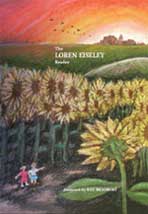The Innocent Assassins:
Using Eiseley Passages in the Classroom
Eiseley Curriculum Materials
Produced by the Loren Eiseley Society
by Michael W. Antrim

[left]: Reconstructed CT Image of the Innocent Assassins Fossil of Two Sabre Tooth Tigers in a Death Struggle (25M BC). [right]: The Innocent Assassins Fossil.
This 3D model can be examined by viewing The Innocent Assassins Visualization on YouTube.
Contributors to this image: Nebraska State Museum (home of the original Innocent Assassins fossil exhibit), University of Nebraska Medical Center (CT scanner), the College of Engineering and the Peter Kiewit Insitute (rapid prototyping laboratory reconstruction), and the Department of Computer and Electronics Engineering (University of Nebraska - Lincoln)
Acknowledgements: Dr. Mark Harris, University of Nebraska State Museum, Dr. Hani Haider and Ms. Deb Ritonya, University of Nebraska Medical Center, Professor John Bonsell and Steven J. Eggerling, UNL College of Engineering at The Peter Kiewit Institute

"The Innocent Assassins" as depicted in an original 2007 oil painting by artist Jan Vriessen (recommended by Dr. Kirk Johnson, Denver Museum of Nature & Science). Concept for oil painting, posters and postcards by: Ray Boice of the Fossil Freeway (member LES, Gering, Nebraska)
Although Loren Eiseley is best known for his prose, he also wrote several volumes of poetry. Perhaps his best known poem is The Innocent Assassins [PDF], found in a book by the same name. The poem relates to an experience of Eiseley when he was part of the Nebraska State Museum bone hunting team on a dig in the Wildcat Ridge area near Bayard, Nebraska in 1932.
The famous fossil discovered by Eiseley and others on this dig, is of the skull of a
sabertooth cat, whose fang is locked in the leg of another sabertooth. It is all that
remains of a 25 million year old cat fight! Today, the fossil can be seen at the Nebraska
State Museum, and a postcard of the fossil is sold at the museum. The postcard is from a
photograph from The Cellars of Time by the NEBRASKAland Magazine.
Lesson ideas using the Innocent Assassins:
- Student Essay. Have students carefully observe the postcard of the sabertooth cat and have them read the poem, The Innocent Assassins. The students then write an essay relating to the poem.
- Creative Writing. Show students the postcard of the famous sabertooth cat fossil (with fangs embedded in the leg of another sabertooth). Have the students produce a creative narrative in which, in an Eiseley style, they describe the scene and tell a story of this 25 million year old cat fight.
- Other writing lessons. Bring in interesting fossils, or show pictures of fossils (especially skulls) and have students write their own poems or stories about the animal.
- Art project. Have students draw the scene of the 25 million year old cat fight.
- Sabertooth research. Have students research and write a report or produce a multimedia stack on sabertooth cats. They could include the Innocent Assassins fossil and the Eiseley poem in their project.
Note: This lesson has been developed as an activity of the Loren Eiseley
Society (Education Outreach Committee). Additional classroom materials are being
developed, including lessons that focus on creative writing activities.
Any comments, suggestions, and support will be appreciated. Education Committee
contacts:
Bing Chen, UNL
(402) 554-2769
bchen1@unl.edu
Michael W. Antrim, Formerly of Omaha Burke High School
Member Education Outreach Committee

